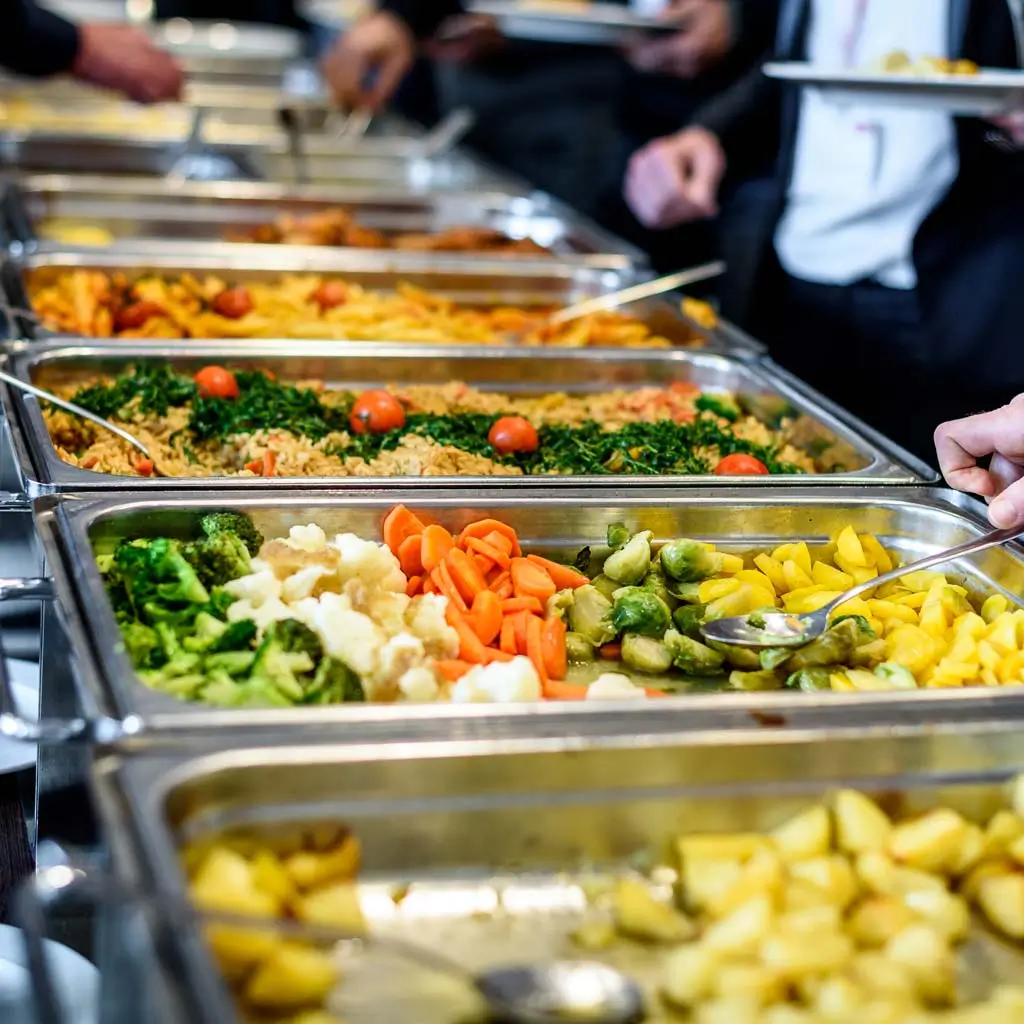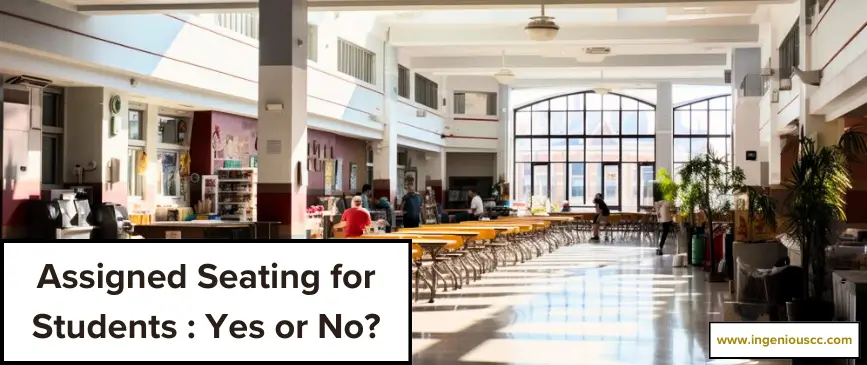Introduction
Ever wondered what it takes to keep the school cafeteria running like a well-oiled machine? Of course, the dedicated and compliant cafeteria staff is behind all the services and actions. From prepping meals to managing the lunch rush and decorating the lunchrooms, these people connect, perform hands-on tasks, and feed nourishing young minds.
But…
Beyond the handling of a clutter of trays, lunchtime chatter, and the bustle of hungry students lies a role that comes with its own thrills and spills, demanding resilience and rewarding dedication.
This article delves into the job responsibilities and pros and cons of working in a school cafeteria, examining the advantages and disadvantages of this dynamic environment. Join us as we explore what it entails to thrive in this lively yet brisky setting.
Working in a School Cafeteria: What it Entails?
Having witnessed the dedication of cafeteria workers firsthand, we have seen how they go above and beyond to ensure that students receive nourishing meals. Despite the demanding nature of their work, their commitment to providing quality food and fostering a positive dining experience is evident. Their role in supporting children’s health and education is invaluable and deserves recognition.
The Process
- Arrive early for setup
- Follow meal plans
- Preparation and cooking
- Maintaining food safety
- Serve meals
- Clean and sanitize
- Monitor and restock
- Communication
Let’s look closer at the background of the school’s cafeteria dining facility.
Teamwork and Collaboration
School cafeteria workers are part of a cohesive team, collaborating with colleagues such as cooks, servers, and custodial staff. This effective communication and coordination ensures smooth operations and timely meal service.
Food Preparation and Cooking
The day of cafeteria staff typically begins with food preparation tasks, including planning the menu, considering dietary restrictions, and ensuring a balance of nutritious options. From chopping vegetables to marinating proteins, they give attention to every detail to create delicious meals that comply with nutritional guidelines.
Serving Students
Interacting with students is another critical aspect of the job, as cafeteria workers serve as food providers and friendly faces in the school community. Greeting students with a smile, taking their orders, and offering assistance fosters a welcoming environment where students feel valued and cared for.
Suggested reading → 5 Ways to Build a Positive School Culture.
Maintaining Cleanliness and Hygiene
A clean and hygienic environment is paramount in a school cafeteria. Workers adhere to strict cleanliness standards, wearing gloves and hairnets and regularly sanitizing surfaces to prevent the spread of germs.

Navigating Dietary Needs
Catering to dietary needs is essential to working in a school cafeteria. This involves accommodating allergies, religious restrictions, and personal preferences to ensure every student can access suitable meal options. For example, workers may label food items, offer alternative choices, or collaborate with nutritionists to create specialized meal plans.
Stock Management
Cafeteria workers, often led by the head chef and accountant, monitor inventory levels and restock food items as needed to ensure they have an adequate supply of ingredients for meal preparation. This involves tracking what food items are available and what needs to be ordered to maintain a well-stocked inventory.
Safety and Food Handling
Furthermore, adhering to food safety protocols is paramount in a school cafeteria. Workers receive training on proper food handling techniques to prevent contamination and ensure the safety of the meals served to students.
Customer Service Skills
Strong customer service skills are essential for interacting with students, teachers, and other staff members in a friendly and professional manner. The functional staff and employees are trained to address students’ needs and promptly address complaints even during busy periods.
Challenges and Rewards
Finally, working in a school cafeteria comes with its own set of challenges and rewards. One of the primary challenges in cafeteria management is the high volume of orders during peak meal times, which requires efficiency and organization to prevent long wait times.
Additionally, addressing dietary restrictions and preferences can be complex, requiring adaptability and creativity in meal planning.
However, the rewards of working in a school cafeteria are plentiful. Interacting with students and witnessing their enjoyment of nutritious meals is incredibly gratifying. Building relationships with students and staff promotes community and belonging within the school.
Moreover, knowing that your efforts contribute to the health and well-being of students makes the job inherently rewarding.
| The Bottom Line of Working in School Cafeteria | ||
| Experience | Duties | Challenges/Rewards |
| Contributing to a positive school environment | Preparing and serving meals | Rewards: Relationships, Community <br> Challenges: Dietary restrictions, Crowds |
| Working in a fast-paced environment | Cleaning and maintaining kitchen equipment | Rewards: Teamwork, Camaraderie <br> Challenges: Multitasking, Menu changes |
| Collaborating with other cafeteria staff | Ensuring food safety and hygiene | |
| Handling cash transactions and POS systems | Managing inventory and ordering supplies | |
| Adapting to dietary restrictions and allergies | Monitoring food quality and temperature | |
| Participating in professional development workshops | Following health and safety regulations | |
| Resolving conflicts or issues with students | Collaborating with school administration | |
Thinking of being the one? Working in a school cafeteria might be the perfect fit for you! But before you finalize your decision, here are the ins and outs to watch out for.
Pros And Cons Of Working in A School Cafeteria
The Pros
Working in a school cafeteria offers many benefits beyond just a paycheck. Let’s delve into the specifics of why becoming a cafeteria worker might be an excellent choice for you:
No Overtime or Weekend Work
Unlike some jobs where you have to work late nights or weekends, cafeteria jobs usually have regular hours. You’ll finish work early in the afternoon, giving you plenty of time for other things you enjoy outside of work.
Sense of Purpose
When you work in a cafeteria, you’re helping to make sure kids eat healthy food. It feels good to know you’re making a difference in their lives by giving them nutritious meals.
Suggested reading → How To Improve School Cafeteria Food.
Physical Activity
Cafeteria jobs involve physical activity, like standing, walking, and lifting. This helps you stay active during the day, improving your health and well-being.
Free Meals
One great thing about cafeteria jobs is that you get free meals. That means you don’t have to spend your money on breakfast or lunch. Imagine saving $10 a day on meals – a lot of money you can keep in your pocket.
Get Health and Retirement Benefits
Whether you work full-time or part-time, you’ll get good benefits like health insurance and retirement plans. In some states, like Texas, you might even get a pension when you retire. Plus, you can save more money for retirement with other accounts.

Learn New Things
A good chance is that you will learn valuable skills like cooking and serving food in a cafeteria job. These skills can also help you in other areas, like restaurants or stores.
Learn along → Best Lunch Menu Options for a School Cafeteria
Enjoy Plenty of Breaks
Working in a school cafeteria means you get lots of time off, especially during holidays and summer vacations. While most people have holidays like Easter and Thanksgiving off, some schools even have programs that provide meals for kids during the summer. If you want to, you can work during the summer too and earn some extra money.
Fun and Friendly Environment
Working in a cafeteria is often fun and friendly. You’ll get to know the kids and have a good time chatting with them. Even though there’s some physical work involved, it’s usually a happy place to be.
Discover New Foods
Working in a cafeteria is a great way to learn more if you are interested in cooking or food. You’ll try out different recipes and learn about healthy eating, keeping kids healthy, and boosting the experience of cafeteria food.
Job Security
Schools always need cafeteria workers to help provide meals for students. This means there’s often job security in this field, giving you peace of mind about your employment.
The Cons
Leading up a healthy school cafeteria may seem straightforward, but like any occupation, it comes with its own set of challenges. While it’s not all bad, there are several cons to consider.
Hard Work
Get ready to break a sweat. Working in a school cafeteria means dealing with hefty food containers, ample cooking utensils, and cooking for many hungry kids. It’s physical work that requires some serious muscle.
Dealing with Food Restrictions
With an increasing number of students having dietary restrictions or allergies, navigating food safety and accommodations can be challenging. You’ll need to stay informed about various nutritional needs and ensure meals meet specific requirements, adding complexity to your job.
Menu Control Constraints
Ever dreamt of designing the perfect lunch menu? Well, you might have to put that dream on hold. While you can suggest ideas, the final menu decisions are usually made by someone else, leaving you with less control over what’s served.
Career Advancement Challenges
If you want to climb the career ladder, you might find yourself stuck on the bottom rung. There’s little room for advancement in cafeteria jobs, which could leave you stagnant in your career.

Physical Fatigue
The physical demands of the job can take a toll on your body. From standing for long hours to lifting heavy objects, cafeteria work can lead to fatigue and discomfort, especially if proper ergonomic practices aren’t followed.
Negative Perception
Prepare to face some stereotypes. Sadly, cafeteria workers don’t always get the respect they deserve, and there’s often a negative stigma attached to the job.
Salary Struggle
Unfortunately, the pay for cafeteria workers isn’t exactly something to write home about. It usually falls between $9 to $16 an hour, which might make you miserable for a while.
Irregular Schedules
Working in a school cafeteria often means irregular or unpredictable hours. You might have to start early to prepare breakfast or stay late for after-school events, making it challenging to maintain a consistent schedule.
A Shoutout to the School Administrations!
Looking to boost the performance of your cafeteria staff? Consider booking a consultation with us at Ingenious Culinary Concepts. Our interactive coaching sessions provide hands-on support for your team to excel in supporting schools.
Summary Table
A quick recall.
| Pros | Cons |
| No Overtime or Weekend Work | Compensation Concerns |
| Sense of Purpose | Physical Demands |
| Physical Activity | Handling Dietary Needs |
| Free Meals | Menu Control Constraints |
| Get Health and Retirement Benefits | Career Advancement Challenges |
| Learn New Things | Physical Strain |
| Enjoy Plenty of Breaks | Social Perceptions |
| Fun and Friendly Environment | Irregular Schedules |
| Discover New Foods | |
| Job Security |
Conclusion
So, all things considered, working in a school cafeteria has ups and downs. On the bright side, you get to be a part of the school community, serve tasty meals, and make a few friends. On the other hand, there are those days when it feels like you are running a marathon in the kitchen, dealing with tight budgets, long hours on your feet, and the occasional rowdy student taking over the toll.
But at the end of the day, it really comes down to what matters most to you. However, at ICC, we believe that by working in the cafeteria, you are making a difference in kids’ lives by keeping them fed and fueled for the day. Still, if you are more into higher pay, you should explore other options. After all, the decision is all yours.
Suggested reading → How to Create the Best High School Cafeteria?
FAQs
Are there opportunities for advancement in school cafeteria jobs?
Advancement opportunities may vary, but additional nutrition or food safety training could lead to higher-paying roles.
How does working in a school cafeteria compare to other food service jobs?
Working in a school cafeteria offers a more predictable schedule but may come with lower pay. Focusing on serving students and adhering to school guidelines sets it apart, providing unique opportunities for interaction and contribution to the school community.
What is the atmosphere like working in a school cafeteria?
The atmosphere can be lively and fast-paced, especially during meal times. There’s often a sense of harmony among staff, and interactions with students can be rewarding. However, it can also be challenging to manage large crowds and meet the demands of serving meals efficiently.
What are the job responsibilities of working in a school cafeteria?
Roles typically involve food preparation, serving meals, maintaining cleanliness, and adhering to food safety regulations. Some positions may also involve cashier duties and inventory management.
What qualifications or skills are needed to work in a school cafeteria?
While specific requirements may vary, candidates typically need basic math skills, following recipes and food safety guidelines, and good communication skills for interacting with students and staff. A high school diploma or equivalent may be required for some positions.



